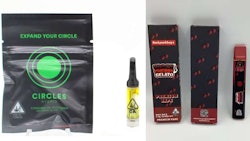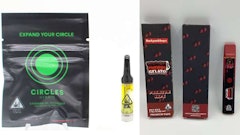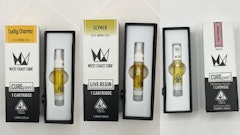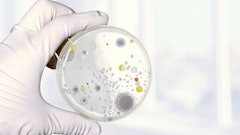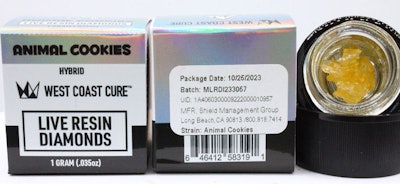
California cannabis regulators issued mandatory recalls Aug. 29 for two more West Coast Cure (WCC) products after state laboratory testing detected the presence of chlorfenapyr, a deadly pesticide, according to the Department of Cannabis Control (DCC).
WCC products are manufactured under the legal business name of Los Angeles-based licensee Shield Management Group LCC.
The WCC products recalled Aug. 29 include:
- A “CUREpen premium THC oil” vape cartridge (Batch No.: VPPL234378 | UID No.: 1A4060300009222000010378) that was sold on or after Sept. 14, 2023, at 93 licensed dispensaries in 25 counties; and
- A “live resin diamonds” concentrate (Batch No.: MLRDI233057 | UID No.: 1A4060300009222000010957) sold on or after Nov. 2, 2023, at 105 retail locations in 30 counties.
These two recalls come after the DCC issued mandatory recalls July 2 for five WCC vape cartridge products. The department also cited the presence of chlorfenapyr in those recalls. A DCC spokesperson told Cannabis Business Times at the time that the department could not provide additional information on the recalls because its officials view the recalls as active investigations.
RELATED: Cannabis Products Contaminated With Deadly Pesticide Recalled From California Market
While California’s cannabis recall process plays a vital role in consumer safety, the unanswered question of how a product with a deadly pesticide ends up on the market—and stays on the market for several months—diminishes consumer confidence.
Specifically, before any California cannabis product can be packaged and distributed to licensed dispensaries, cultivators and manufacturers must have them tested by a DCC-licensed laboratory for the following: cannabinoid and terpene content, residual solvents and processing chemicals, residual pesticides, heavy metals, microbial impurities, mycotoxins, moisture content and water activity, and foreign material.
In addition to the state-mandated testing, WCC performs quality control testing with labs before production and packaging, according to a company press release provided to CBT following the July 2 recalls.
“We have passing compliance tests from state-licensed laboratories for every one of our products that is sold to consumers,” the WCC release stated. “In 2023 alone, West Coast Cure invested nearly $1 million in testing, utilizing multiple licensed laboratories to perform thousands of tests.
“At the end of the day, West Coast Cure is not a testing laboratory, nor are we permitted to be one by California regulations. The system set up by the state requires us to rely on tests conducted by third-party laboratories that have been licensed and certified by the state of California to perform the required tests in accordance with the regulations. We strongly believe the DCC should adopt, implement and enforce rules for testing laboratories to ensure that testing is done correctly and in a way that produces comprehensive, accurate and consistent results across all laboratories.”
Beginning Jan. 1, 2024, the DCC required California’s licensed testing labs to use the department’s standardized testing method and operating procedures for testing cannabinoids.
"At this time the DCC does not require a standardized testing method for contaminants, however, all methods used by licensed laboratories must be reviewed and approved by the department," DCC Public Affairs Deputy Director Glynnis Vaughan told CBT Aug. 30.
When it comes to the genesis of recent recalls—for pesticides and the common mold Aspergillus—the DCC has taken products from the supply chain, either from retailers or distributors, and performed its own tests.
However, the DCC hasn’t offered much insight into their methods other than when Media Relations Manager David Hafner confirmed with CBT that the department uses a quantitative polymerase chain reaction (qPCR) testing method for Aspergillus. Because qPCR testing looks for DNA, it can, in some cases, generate a false positive based on DNA from a dead spore
“All of the department’s recalls are considered active investigations, and we cannot disclose any specific information related to this investigation at this time,” Hafner said regarding the specific test results from an Aug. 16 recall.
RELATED: Glass House to Appeal DCC Recall for Pre-Roll: ‘We’ve Gotten No Information’
The DCC’s recent spike in recalls—including 37 so far this year after only issuing five recalls throughout 2023—has raised some questions among industry stakeholders. What changed?
Kieran Ringgenberg, an Oakland-based partner at Feuerstein Kulick LLP who has focused his work on cannabis industry clients since 2016, recently told CBT that “it appears” the DCC began a new program to take product from the supply chain for testing some time around the end of 2023 or beginning of 2024.
“We don’t exactly know when they started testing, how often they test, how they select what products to test, or what all they test for,” Ringgenberg said. “Critically, virtually nothing about the DCC testing for Aspergillus has been disclosed, though the licensees have repeatedly asked the department about it.”
In addition to consumer safety, consumer confidence in the regulated cannabis supply chain is critical, Ringgenberg said.
“The mandatory testing by licensed cannabis operators is a key reason consumers should, and do, buy cannabis from the legal supply chain rather than from illicit sources, even though it is often more expensive,” he said. “To ensure that the licensed market succeeds over the illicit market is a key part of the DCC’s mission. However, the DCC’s failure to be more transparent around its Aspergillus testing and recalls is harming consumer confidence unnecessarily. … In my view, transparency about the testing would better serve the department’s objectives.”
Regarding the recent string of mandatory recalls for WCC products, company officials stated in the July 2 release that they believe the DCC has established proficiency testing standards that do not mirror the standards established for compliance tests.
“We want to work with industry leaders and the DCC to create standards, third-party accreditation, and other requirements that all laboratories must follow in order to achieve accurate, consistent and verifiable results,” according to the release. “This is the only way to have fair comparisons and ensure that test results are consistent and accurate in order to re-instill consumer confidence in lab testing.”













